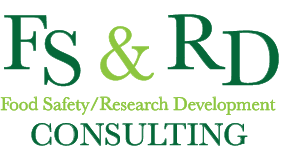Validation studies vs. Challenge studies - How are they different?
With every HACCP (Hazard Analysis Critical Control Point) program there will be the need to complete validation studies. Validation studies are studies that look at the worst case scenarios that could happen around a processing step. It is a study that will prove your manufacturing process is completely safe under a variety of potential variables that are likely to happen during your process.
Validation studies need to be done on all of your critical control points within your process. This ensures that your product is safe under any potential conditions. You should also complete validation studies on your pre-requisite program such as labeling, metal detection, etc. to ensure that these processes have covered all of the potential "worst case scenarios" that can happen within these processes.
EXAMPLE: If I were to use cooking as an example and say that your CCP is that your product needs to be cooked to a minimum of 72C. The validation study would need to look at your thermometers, the oven and any other measurement tool that you are using. Let's say it is a really large stationary oven. Within this oven, you have the potential for cold spots and with the thermometer there is a certain amount of tolerance on the temperature given. (typically .1 C). Therefore the study would need to look at the oven with multiple products under various conditions in various locations to ensure that not matter what condition you are under you are still maintaining safety. Tests would need to be done when the oven is at its fullest, under different operators, with the largest product, in different locations etc. By looking at the process in this amount of detail you will be able to validate that your process is safe under any condition.
Challenge studies or a microbial challenge study is used to mimic what happens to a product during its processing and distribution if it were microbiologically contaminated. Challenge studies are typically done within an external laboratory setting in order to ensure you maintain safety in your manufacturing environment.
Challenge studies are done by first inoculating the product with the pathogens that would most likely pose a hazard for that particular product. ie. dry cured sausage - you may wish to inoculate with Listeria Moncytogenes, Salmonella, E.coli 0157:h7 or Staph. Aureus. After you've selected your pathogens the laboratory will then follow the same process that you use at your manufacturing site to mimic the conditions it would follow. Microbiological testing may be done along the way to determine how your processing steps may impact the pathogen growth.
Depending on your needs, the inoculation may occur at the start of the process, during or at the end of your process depending what your end goal is. You may wish to see if your process causes a pathogen reduction or a kill-off of the pathogens, or you may wish to ensure that the product that you've formulated is safe even if those pathogens are normally in low numbers.
Knowing when to perform either a validation or challenge study, how to design and conduct such a study, and how to interpret the results is important for you, as a manufacturer. This will help you to produce high quality, safe and stable products that meet both the regulatory mandates as well as consumer's expectations.
